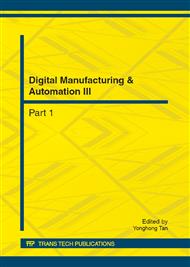p.83
p.88
p.93
p.97
p.101
p.106
p.111
p.115
p.121
Knowledge Representation for Process Planning of Mechanical Parts Based on Ontology
Abstract:
The idea of ontology is introduced into knowledge representation for process planning of mechanical parts to support knowledge sharing and reuse, which means knowledge is expressed abstractly as domain ontology according to the characteristics of process planning of mechanical parts. Process planning domain ontology is an explicit and elaborate description of a conceptualization in the process planning domain, i.e. it is with five elements: concepts, relations, attributes, rules and cases. Domain ontology is constructed by abstracting and describing the five elements from process planning, and is stored within relational database. An example is included to demonstrate the operation of the proposed approach and show effectiveness in knowledge representation for process planning of mechanical parts.
Info:
Periodical:
Pages:
101-105
Citation:
Online since:
July 2012
Authors:
Price:
Сopyright:
© 2012 Trans Tech Publications Ltd. All Rights Reserved
Share:
Citation:


